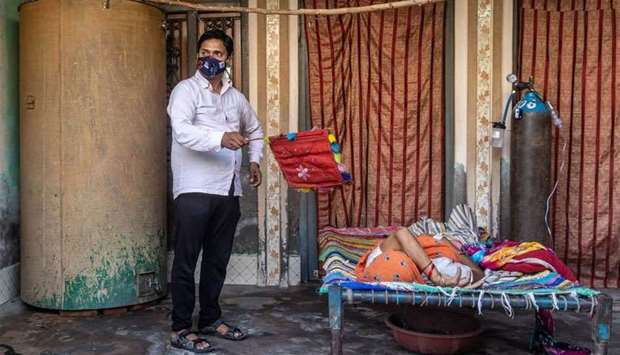Nearly two-thirds of people tested in India have shown exposure to Covid-19, a chain of private laboratories said yesterday, indicating a runaway spread of the virus as the daily death toll rose to a record 4,529.
India reported 267,334 new daily infections yesterday, taking its tally to 25.5mn, the world’s second highest after the US, with a death toll of 283,248, health ministry data showed.
For months, nowhere has been hit harder than India by the pandemic, as a new variant discovered there fuelled a surge of up to more than 400,000 new infections a day.
With hospitals and crematoria overflowing and the health system overwhelmed, it is widely accepted that the official figures grossly underestimate the real impact of the epidemic, with some experts saying infections and deaths could be five to 10 times higher.
There are fears that the new, highly infectious variant is out of control and that many cases are going unreported because of lack of testing, particularly in the vast countryside.
Data from Thyrocare, a chain of private laboratories, appeared to back up those fears, showing that 63.5% of people tested positive for Covid-19 antibodies on average over the last seven days, up from 45% a month ago.
The data from 25 states included individuals infected in the past, vaccinated, uninfected and those who had not been vaccinated, the company’s chief executive Arokiaswamy Velumani said on Twitter.
Criticism of Prime Minster Narendra Modi has been rising but M Govinda Rao, a former member of the economic advisory council to the prime minister, said the rate at which the virus was spreading had caught everyone by surprise.
“The unprecedented speed at which the second wave of the pandemic spread completely took the (state) governments as well as the people off guard,” Rao told the Hindu newspaper.
Daily testing hit a record 2mn on Tuesday, figures from the state-run Indian Council of Medical Research showed.
But that still falls short of India’s claimed daily testing capacity of 3.3mn, said Rijo M John, a professor at the Rajagiri College of Social Sciences in the southern city of Kochi.
John also questioned how useful the results of the tests were.
“Many of these tests are being deployed in urban centres, where cases may have peaked and so it doesn’t serve much purpose,” John said.

Dinesh Kumar, 32, fans his mother Chandravati Devi, 55, suffering from breathing difficulties, as she rests in a cot while receiving oxygen support at her home, amidst the spread of the coronavirus disease (COVID-19), in Mewla Gopalgarh village, in Jewar district, in the northern state of Uttar Pradesh, India, recently. (REUTERS)
